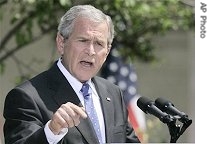2007年VOA标准英语-Both Houses of US Congress OK Iraq War-Funding(在线收听)
Capitol Hill
24 May 2007
The U.S. Congress has approved legislation supporting military operations in Iraq, with majority Democrats calling it the best achievable at this time, and Republicans claiming victory in forcing Democrats to drop a withdrawal timetable. Approval by the House of Representatives, by a vote of 280 to 142, sent the measure to the Senate where few hours later, Senators passed the bill by a vote 80 to 14. The measure is now ready for President Bush's signature. VOA's Dan Robinson reports from Capitol Hill.
Stripped of withdrawal language, the $120 billion measure is the result of weeks of intense negotiations since President Bush vetoed an initial Iraq funding measure.
Democratic leaders faced intense pressure from the far left of their party to impose a timetable, but resistance from President Bush forced them to back down, at least for now.
Congresswoman Louise Slaughter summed up the dilemma for her fellow Democrats. "The president and his allies in Congress have put our soldiers in harm's way and Mr. Bush is willing to keep them there no matter how much they suffer. If this Congress delayed funding by continuing to back a bill we cannot pass at this time, we would not force the president to end the war. All indications are he would leave our soldiers in Iraq, and without adequate funding they would have to do even more with even less," she said.
Republicans pointed to success in forcing Democrats to remove withdrawal language, which they assert would have harmed U.S. troops and threatened the defense of Iraq from al-Qaida.
"We simply cannot and will not strengthen the hands of terrorists who have made the destruction of America their number one priority. We cannot and will not abandon the Iraqis to be butchered by these terrorists in their midst. And we cannot and will not abandon our mission just as real progress is starting to be made," said Congressman David Dreier.
But Democratic leaders insist that President Bush's agreement to have the bill include political, security and economic benchmarks the government of Iraq must achieve is a victory in itself.
 |
| President Bush gestures during a news conference in the Rose Garden of White House, 24 May 2007 |
To ensure passage House Democratic leaders required two votes, one on $99.5 billion for Iraq and Afghanistan military operations through September, the other for billions in additional domestic spending.
The next phase for Democrats in trying to wind down the war is to target separate defense bills and another Iraq supplemental spending request between June and September.
Also on the Democratic agenda, says House Speaker Nancy Pelosi, is a measure later this year to repeal the 2002 measure that gave the president authority to begin military action in Iraq. "This is not the end of the debate. We have to be here to bring this bill to the floor so we can go forward, but this debate will go on," she said.
In a rare display of emotion, Republican minority leader John Boehner asserted Democratic tactics merely send a negative message to the troops, and distract from the larger war against terrorists. "I think at the top of our list is providing for the safety and security of the American people. That is at the top of our list. After 3,000 of our fellow citizens died at the hands of these terrorists, when are we going to stand up and take them on, when are we going to defeat them?"
Meanwhile, Democratic leaders face criticism from the most outspoken anti-war members of their party, such as Senator Russ Feingold. "Instead of forcing the president to safely redeploy our troops, instead of coming up with a strategy providing assistance to a post-redeployment Iraq, and instead of a renewed focus on the global fight against al-Qaida, we are faced with a spending bill that just kicks the can down the road (continues congressional funding), and buys the administration time," he said.
The funding battle between Democrats, on one hand, and Republicans and the president, on the other, also promises to affect the 2008 presidential race, as key Democratic front-runners will face pressure to explain their votes, while Republican candidates will have to decide how close they remain to the president if violence in Iraq does not abate.